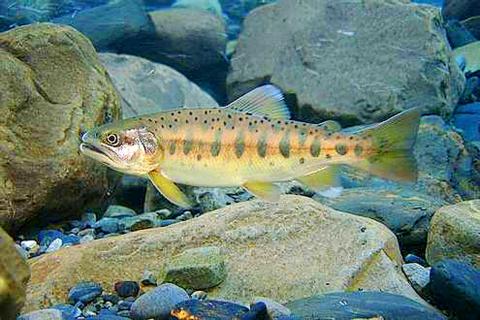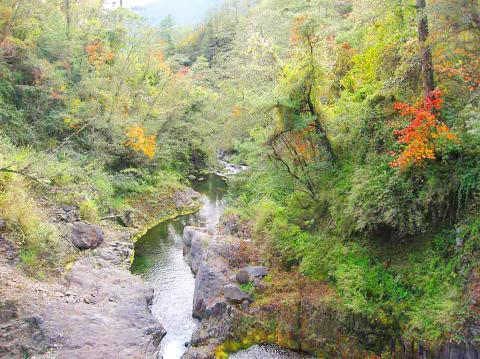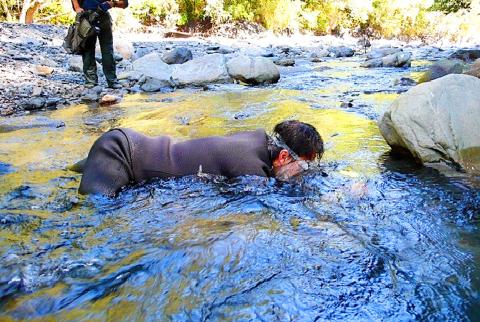Salmon is a migratory fish, born in an upstream river freshwater environment, from where it migrates to the sea. The adult fish then swims back upstream to the place of its birth to reproduce. It is a cold-water fish, living in temperate zones.
A species left over from the Ice Age

Photo courtesy of a reader
照片:讀者提供
Formosan landlocked salmon is a subspecies of the Pacific salmon, living in subtropical Taiwan. This makes the subspecies endemic to Taiwan. The mountain formation that took place 15,000 years ago, at the end of the Ice Age, blocked the way to the sea. This is how the salmon became landlocked.
Formosan landlocked salmon is, then, unique to Taiwan’s mountain rivers, a relic of the Ice Age. It is an example of an “ice age relic species,” a rare “living fossil.” It is known as a “national treasure fish.”

Photo courtesy of Shei-Pa National Park Administration Office
照片:雪霸國家公園管理處提供
Extinction crisis
Formosan landlocked salmon thrives in rivers 2,000 meters above sea level, in waters not exceeding 17 degrees Celsius throughout the year. During the winter months, temperatures of about 10 degrees Celsius are needed for breeding. Large volumes of fresh, uncontaminated water are also crucial.
In 1995, the numbers of Formosan landlocked salmon had dwindled to 200. The species was on the verge of extinction.

Photo courtesy of Shei-Pa National Park Administration Office
照片:雪霸國家公園管理處提供
According to the Shei-Pa Park Administration Office, typhoon flooding and fragmented habitats caused by global warming, as well as farming activity, have all taken their toll on the survival of Formosan landlocked salmon.
Shei-Pa Park conservation efforts
Since its establishment in 1992, the Shei-Pa National Park has been actively engaged in conservation efforts. Through cultivation and restoring the historical habitat, the Formosan landlocked salmon in the Qijiawan River can now reproduce. According to the latest research, published on March 15, there are now 5,059 Formosan landlocked salmon in the river. This is close to the river’s maximum capacity of 5,800. This species, with its long history, can once more thrive in Taiwan.
(Translated by Lin Lee-kai, Taipei Times)
鮭魚是洄游性魚類,在河流的淡水環境中出生後,移居大海成長;長成後會從大海溯河而上,回到牠出生的河流上游繁殖。鮭魚屬冷水魚,生活在溫帶地區。
冰河時期遺留之物種
「櫻花鉤吻鮭」是太平洋鮭屬的鮭魚亞種,卻生長在亞熱帶的台灣,是台灣特有亞種。這是因為一萬五千年前冰河時期末期,台灣地形隆起成高山,使得原本在台灣的鮭魚因地形阻隔,而成為「陸封型」魚種。
因此櫻花鉤吻鮭是冰河時期遺留在台灣高山溪流的特殊魚種,為「冰河孑遺生物」代表之一,是稀有的活化石,而有「國寶魚」之稱。
瀕臨絕種危機
櫻花鉤吻鮭的生存條件,須為海拔兩千公尺處,終年河水最高溫不能超過攝氏十七度,冬天必須有十度左右的低溫,適合繁殖;最重要的是水源充足,未遭汙染破壞。
據一九九五年統計,櫻花鉤吻鮭族群數量僅剩兩百尾,瀕臨絕種。
雪霸國家公園管理處指出,颱風洪水是衝擊鮭魚族群生存的關鍵因素。另外,在全球氣候暖化及高山農業耕種等影響下,櫻花鉤吻鮭生存的棲地破碎,也是原因。
雪霸公園復育工作
雪霸國家公園自一九九二年成立以來積極進行復育,透過人工繁殖配合棲地復舊保育,目前七家灣溪流域的櫻花鉤吻鮭已能自我繁衍。本月十五日發布的最新研究成果顯示,鮭魚數量已達五○五九尾,接近溪流的五八○○尾承載量,成功保存此萬年物種。
(台北時報林俐凱整理)

If you think you’re cool and know all the latest trends, then here’s a question for you: What does the word “brat” mean? If you said something like, “a child who behaves badly or is annoying or rude,” you might not be as hip as you think. This four-letter word now has a new definition that has become quite popular. Its popularity caught the eye of Collins Dictionary, which crowned it as “Word of the Year 2024.” According to this new meaning of brat, it is used as an adjective to describe someone who has a confident, independent, and hedonistic

A: Seeing as the 2025 Michelin Guide extended to New Taipei City and Hsinchu City and County, it’s hard to believe that none of the restaurants won a Michelin star. B: Some fine establishments — like Hsinchu’s A Cut steakhouse — surely deserve the honor. A: Michelin-starred restaurants have good quality food, but some of them are so pricey. B: I once had barbeque pork at a starred restaurant that set me back NT$4,800. That’s even higher than my weekly food budget. A: No wonder several of them have closed down recently, as high prices and the tariff war are scaring off

★ Bilingual Story is a fictionalized account. 雙語故事部分內容純屬虛構。 “Get in. It’s pouring.” She slid into the back seat, drenched and silent. “Tissues?” the driver asked. “No, thank you,” she said. Water beaded off her hair, ran from her coat, and made a small lake on the vinyl. She kept her head down, long black strands clinging to her face. “Where to?” She gave an address. “Funeral?” he asked as they slipped into the Xinhai Tunnel, rain fading to a hollow drum. She glanced up, puzzled. “No. Why?” “Crematorium’s about the only thing here.” He caught her eyes in the mirror.

Continued from yesterday(延續自昨日) https://www.taipeitimes.com/News/lang Interestingly, one of the words Collins Dictionary discarded was selected by Oxford University Press (OUP) for its own Word of the Year. On its Web site, the publishing house of the University of Oxford stated it had conducted a public poll in which over 37,000 people participated. The voters, along with OUP’s language experts, settled on the term “brain rot.” One main reason for the decision was the vast amount of interest in the noun during 2023 and 2024, with its usage increasing by 230 percent. In fact, brain rot is not a new term by any